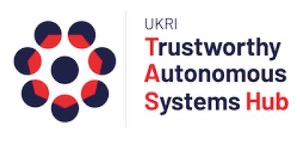
Trusted autonomous systems in defence:
A policy landscape review
The UK Research and Innovation (UKRI) TAS Hub, led by Electronics and Computer Science’s Professor Sarvapali Ramchurn, establishes a collaborative platform for the UK to deliver world-leading best practices for the design, regulation and operation of ‘socially beneficial’ autonomous systems which are both trustworthy in principle, and trusted in practice by individuals, society and government.
Sitting at the centre of the £33M Trustworthy Autonomous Systems Programme Programme, funded by theUKRI Strategic Priorities Fund, the Hub assembles a team from the Universities of Southampton, Nottingham and King’s College London who will engage with over 60 project partners in areas ranging from computing and robotics to social sciences and the humanities.

These initial three challenges are:
We will need to work across disciplines and sectors, and take an inclusive approach, to ensure that autonomous systems are trustworthy by design and trusted by individuals and the wider society.
Drawing on both the policy and the academic literature, policy landscapes were produced by researchers at the Universities of Southampton, Nottingham and King’s College London, where the current landscape was reviewed, the potential future applications of these technologies was considered, and the challenges and opportunities these present to policymakers and those in the sector was assessed. Read more about the Policy Landscape Review series here.
Focusing on “Defence”, Juljan Krause, PPS Policy Associate and PhD researcher at the University of Southampton, explored how trust in autonomous systems among the armed forces can be improved and discusses some of the novel challenges that human-machine teaming presents, and how private sector innovation in defence complicates building trust. Read the full report here:


A policy landscape review

Why it's time for a more nuanced discussion of autonomous defence systems

Are autonomous systems a solution to labour shortages in the logistics sector?
Justyna Lisinksa, a Policy Research Fellow at the Policy Institute and Kings College London explored if autonomous systems could be a solution to labour shortages in the logistics sector. Read the article above
Yazdanpanah V, Gerding E and Stein S. (2021). Formal Methods to Verify and Ensure Self-coordination Abilities in the Internet of Vehicles. Computational Logistics : 12th International Conference, Iccl 2021, Enschede. (pp. 410-424)